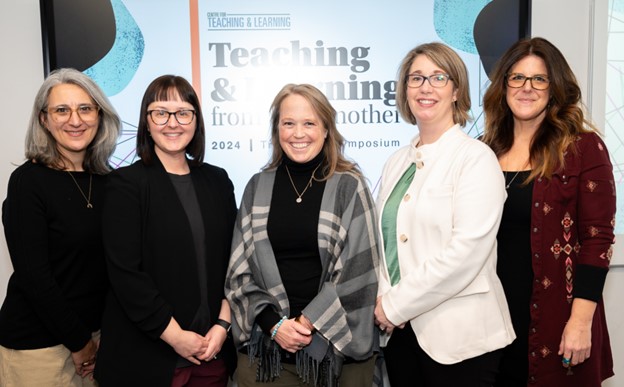Teaching Outside the Box
March 19, 2024
 From left to right: Wickerson Foundation Fund recipients Dr. Amy Hallaran, Sarah West, Karen Wickerson '87 (Wickerson Foundation trustee), Holly Bates, and Beth Needham.
From left to right: Wickerson Foundation Fund recipients Dr. Amy Hallaran, Sarah West, Karen Wickerson '87 (Wickerson Foundation trustee), Holly Bates, and Beth Needham.
Wickerson Foundation funds faculty projects that examine best practices in accessible education
When an instructor steps into a classroom or lab, or hits “record” on their online lecture, they strive to foster a learning environment where students are welcomed and encouraged to engage with new concepts and ideas. Recognizing, understanding, and working to remove as many barriers to learning as possible is integral to an inclusive and successful learning environment. Trent faculty have been thinking outside the box to improve the accessibility of their classes, trying out innovative techniques and studying the results.
Thanks to the Wickerson Foundation Fund for Educational Leadership and Design, the Trent Centre for Teaching and Learning has supported over 20 instructors in strengthening inclusive design through pedagogical research. The results? Students experience new forms of learning in their classes, across disciplines and spaces, designed to be as accessible as possible to a range of learner needs. Dr. Brent Ryan Bellamy is offering oral assignments where students can record an assignment in place of a piece of writing. In her English class, Dr. Emily Bruusgaard is rethinking synchronous and asynchronous lectures to better address neurodivergent and hearing-impaired learners in the online classroom. She has found that visual and auditory cues help build in routine and can minimize the possibility for distractions and miscommunication.
Chemistry professor Dr. Shannon Accettone is researching best practices in Universal Design for Learning (UDL) in chemistry laboratories. She is looking for tangible and high impact accommodations for students to improve their experiences in the lab. Examples include high contrast glassware for those with low vision, or even talking lab equipment that uses a probe to measure and report outload metrics like temperature and pH. A relatively easy way to remove barriers is to ensure there are lab coats available for all body types. The standard size range available on campus doesn’t suit all students and can mean a delay in having a lab coat at the start of classes while a student waits for a special order.
“For students who are differently abled or experience various degrees of impairment to the senses such as vision and hearing, the laboratory space can prove difficult to navigate,” says Dr. Accettone. This project has also sparked a focus on improving accessibility for service animal-users. “In a lab the service animal needs to wear the same PPE as their owner, so we are working on developing Puppy PPE kits Trent-wide," says Dr. Accettone.
Dr. Accettone presented alongside current and recent Wickerson Foundation Fund recipients at the inaugural Scholarship on Teaching and Learning (SoTL) Symposium held at Trent on February 21, 2024. The day-long event brought faculty together from across the university to share about research and best practices in teaching and learning. Recipients of both the Wickerson Foundation Fund and Teaching Fellowships shared their research.
The event was also a celebration of five years of Wickerson Foundation funding for teaching and learning projects in Universal Design for Learning (UDL). Karen Wickerson '87 (Champlain College), a longtime proponent of UDL and trustee at the Wickerson Foundation, joined the symposium to hear how recipients are reducing barriers to higher education saying, "It's mind-blowing for me to see how committed and passionate all of the faculty at Trent are. What an amazing opportunity for us to all get together to think outside the box."
Learn more at trentu.ca/teaching/research/fellowships-grants.